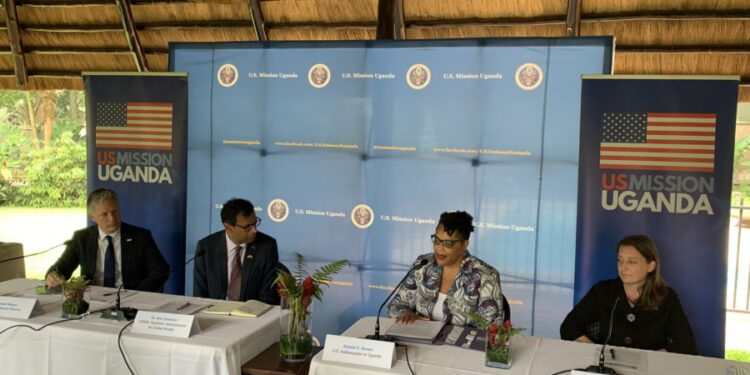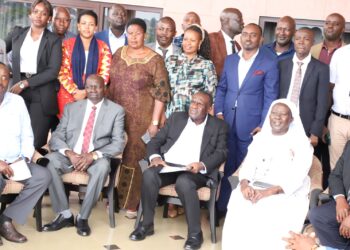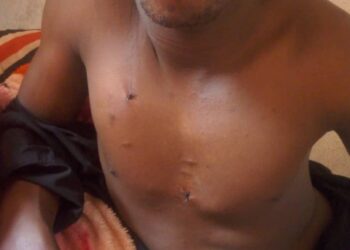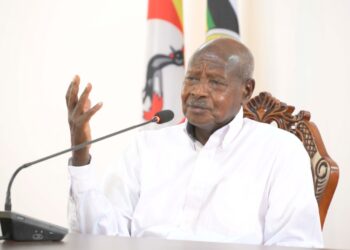On Wednesday, the US Ambassador to Uganda Natalie E. Brown informed the media of their decision to stop funding Ebola response through government entities.
H.E Brown revealed that the new strategy will provide funds directly to partners and agencies to fight the current Ebola Virus Disease epidemic.
She noted that donors had already released $6 million to the Ministry of Health through other entities however the concern raised by different politicians and activists about the increasing corruption tendencies show that most of the money released to the government usually ends up swindled by the officials.
The Ambassador added that the US government works with partners in Uganda because they are located nationwide and they have contacts on the ground and the structures to share a response.
“But I think a very real concern, and I think every Ugandan shares this, is the issue of corruption in Uganda. There was a report released by the IGG about the cost of corruption and how people will say ‘leaking’ donor-associated funds from where they need to go…This is a very real and serious challenge. And that is also one of the reasons why we work with so many partners instead of providing budgetary support,” said Brown.
“For this response, the President made a commitment to other funds. We encourage the ministry of Finance and others to make the funds available for the ministry of Health response. We also appeal to everyone in government and everyone involved to really do what they can to clamp down on corruption. This costs everyone when these funds are leaking out into someone’s pockets instead of the communities and supporting resources,” she said
Meanwhile, according to Brown, the US has already extended $22.3 million (about Shs 83 billion) to Uganda since the outbreak of the viral hemorrhagic fever was declared on September 20, 2022. Out of this money, $5.5 million was allocated to Baylor Uganda to fund contact tracing, alert management, and training laboratory staff on infection prevention and control.
Another $3.8 million was allocated to the Infectious Disease Institute (IDI) to offer emergency medical services and support dignified burials whereas $6.4 million has been offered to UN agencies such as the World Health Organization and UNICEF for coordination, waste management, supporting survivors, and community engagement among others.
The United States has supported Uganda’s Ministry of Health in establishing a national laboratory network by directly supporting the Central Public Health Laboratory (CPHL) and other partner institutions like Baylor University to build test capacity, sample transport and data entry and analysis.
Similarly, the US government has supported the Uganda Virus Research Institute (UVRI) in surveillance for zoonotic pathogens including arboviruses and viruses that cause hemorrhagic fever. CPHL and UVRI have worked together as part of an Uganda Ministry of Health effort to provide safe and effective diagnostic and surveillance services to the country. Through local partners, the US has intensified surveillance efforts to detect Ebola in the affected districts. The support includes:
At least $5.5 million to Baylor-Uganda to support contact tracing, alert management, emergency response coordination, border health, lab training, surge staff and infection, prevention and control (IPC).
$3.8 million to the Infectious Disease Institute (IDI) for IPC, Emergency Medical Services (EMS), contact tracing, Entebbe International airport support, and safe and dignified burials.
All 29 fellows in the U.S. supported Public Health Fellowship Program (PHFP), four program staff, and four incoming PHFP fellows scheduled to start in January 2023 have been supporting case investigation activities, alerts management and contact tracing, and population connectivity across borders (PopCAB) activities to support the response.
To date, fellows have investigated and linked more than 140 confirmed and probable Ebola cases, including those of healthcare workers, and supported the evacuation of ill patients, providing critical information to the response to evaluate the presence of undetected community chains and reduce the impact of the outbreak.
Do you have a story in your community or an opinion to share with us: Email us at editorial@watchdoguganda.com













